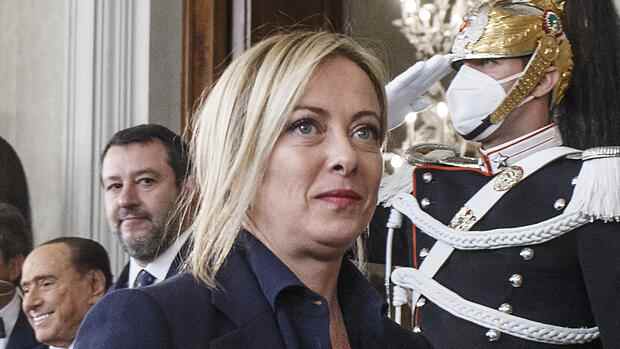Rome The consultations with the President lasted just eleven minutes: Then Giorgia Meloni and her right-wing comrades-in-arms came out of the Quirinal Palace in Rome. “We are ready and we want to move forward in the shortest possible time,” said the party leader of the post-fascist Fratelli d’Italia (FDI) on Friday morning.
A few hours later it is clear: Meloni officially receives the government contract. The 45-year-old, who won the Italian parliamentary elections a good four weeks ago, is likely to be sworn in as the first female prime minister in the country’s history on Saturday morning. There is still a formal hurdle: Meloni must also pass the vote of confidence in both chambers of parliament in the coming week. However, this is considered a formality: the three-way alliance of FDI, the right-wing Lega under Matteo Salvini and the conservative Forza Italia of Silvio Berlusconi has a clear majority in both chambers.
The fact that President Sergio Mattarella would give her the government mandate was considered uncertain until the very end. In the past few days, one of the leading trio in particular has ensured that the alliance falters before it is even in power: Berlusconi. It is his connection to Russia that caused doubts among European partners about the future course of the third-largest euro-economy.
Berlusconi and Russian President Vladimir Putin have been friends for decades. This week, as in a TV show months ago, Italy’s ex-prime minister showed understanding for Putin’s motives for invading Ukraine. Putin is actually a “man of peace,” he said in audio recordings circulating in the Italian press. On top of that, he boasted about his good relationship with Putin: he gave him 20 bottles of vodka for his birthday, along with a “sweet letter”. In return, he sent him Lambrusco wine to the Kremlin. Even friends of Berlusconi’s party were stunned.
Top jobs of the day
Find the best jobs now and
be notified by email.
Meloni’s clear commitment to Europe and NATO
Lega boss Salvini, who is considered a friend of Russia, had repeatedly called for the sanctions against Moscow to be dropped. He was most recently supported by his party friend Lorenza Fontana, who was recently elected head of the Chamber of Deputies. Meloni, on the other hand, has been an unconditional supporter of Ukraine since the beginning of the war and has always supported the course of her predecessor Mario Draghi, even from within the opposition.
In the middle of the week she spoke a word of power in terms of Europe and NATO.
(Photo: ddp/abaca press)
In the middle of the week she then spoke a clear word of power: Italy was fully “part of Europe and the transatlantic alliance”. Anyone who wants to join her government must accept these cornerstones. She even toyed with the idea of not forming the alliance at all if in doubt.
For Berlusconi, things could have come full circle weeks ago: Shortly before the elections at the end of September, at the final rally of the right-wing parties on Rome’s Piazza del Popolo, the media mogul made another big appearance. He has been hailed as the “founder of the centre-right,” the man who made the country’s shift to the right possible in the first place. Meloni is Berlusconi’s legacy – but now the younger generation is calling the shots.
Berlusconi seemed to like the first part of the story, but not the second. Despite his 86 years, he wants to be in the limelight, not behind Meloni. Even if his Forza Italia is the weakest link in the right-wing alliance of three in terms of votes, he wanted to continue to determine ministerial posts, even speak to President Mattarella and steer Meloni in the direction he favored. But Meloni cannot be steered.
Gathering pool for protest voters
She does not owe her rise to power by Berlusconi, who made her the youngest minister in his cabinet at the age of 31. The turning point was when she emancipated herself from Berlusconi – and founded the Fratelli d’Italia ten years ago with old comrades-in-arms from the post-fascist Movimento Sociale. For years, the party bobbed around with single-digit poll numbers.
The messages have always remained the same: strict patriotism, support for the classic family, no to illegal immigration. Over time, the demands caught on with more and more Italians, and the polls slowly rose. Meloni’s wisest decision was not to join Draghi’s “national unity” cabinet in early 2021, like Lega and Forza Italia did. Meloni went into the opposition – and thus became a rallying point for many protest voters.
She has recently been criticized again and again because she has not yet clearly distanced herself from fascism. Your party continues to carry a flame in the national colors in its logo – a reminiscence of the fascist dictator Benito Mussolini. She also appeared at the right-wing Vox party in Spain in June, shouting populist slogans against homosexuals, refugees and other minorities at the crowd.
As radical as she sometimes appeared in the election campaign, she has been moderate since the election: Meloni avoided public appearances, hardly posted on social networks anymore, and repeatedly emphasized that she wanted to set up a “top-class government”. On the commemoration day of the raid in Rome’s Jewish ghetto, she recently declared that anti-Semitism “in every form” must be combated.
More: Mussolini admirer and Russia friend – these are Giorgia Melonis most powerful men in Parliament.
